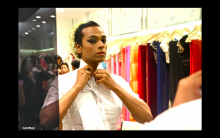Ethnomusicology of the Closet: A New Undergraduate Course Offered at UCLA

Eve Sedgwick ushered in new era of understanding in gay and lesbian studies in 1990 with the publication Epistemology of the Closet, but a major shortcoming of the book is that its treatment of gender and sexuality stems from a distinctly Western perspective. The field of ethnomusicology helped to pluralize our understanding of culture and break down geo-musical barriers, but until recently, has remained relatively reticent about (homo)sexuality and (trans)gender. Addressing this disparity has been the focus of my dissertation research, a process that has led to me wonder how one might engage these topics with undergraduates. Thanks to the support of the UCLA Collegium of University Teaching Fellows (CUTF) program, I will be able to investigate that very question.
During spring quarter, I’ll be embarking on this intellectual journey with a group of bright undergraduate students. Using ethnomusicological material as a point of entry, together we will investigate some of the multivalent constructions of gender and sexuality, raising questions such as: How are gender and sexuality mobilized in culture? How does music reaffirm, construct and/or contest different cultural conceptions of gender, sexuality, and race? What are some of the moral and political implications of queer artistic representation and free speech? What are some of the concerns LGBTQ ethnomusicologists raise about conducting research in the field? Drawing on a variety of critical approaches, this class will be an exploration of the diverse ways in which artists and scholars from around the world perform gender and sexuality.
“Ethnomusicology of the Closet” is designed not only to stimulate discourse on issues of gender and sexuality within the field of ethnomusicology, but also to promote opportunities for interdisciplinary collaboration between UCLA students and faculty. I have the course cross-listed in the departments of Ethnomusicology and Gender Studies, and secured the participation of musicians and scholars from several departments through a series of lecture-demonstrations. The lineup includes presentations from local artists such as Khmer dancer Prumsodun Ok, Bharatanatyam dancer and transgender activist Maya Jafer, musician Kevin Stea, members of the Gay Men’s Chorus of Los Angeles, and UCLA’s very own Sex Squad. We will also discuss issues of ethnographic representation with artists and scholars whose work engages issues of gender and performance, including UCLA alum Rafa Esparza, and current graduate students working in the queer field. We will even hear from experts in public diplomacy, including the Former Consul General at the US Consulate General in Japan, about the implications of being LGBTQ in the field.
In keeping with the interdisciplinary bent of the class, our readings and discussions will include perspectives from the fields of gender studies, ethnomusicology, musicology, anthropology, performance studies, and film studies. The ethnography of music, gender and sexuality is a developing area of study. Investigating some of the latest trends in scholarship, we will look at recently released ethnomusicological writings by Anna Morcom (2013), Jessica N. Pabón and Shanté Paradigm Smalls (2014), and take a sneak peak at field notes and recordings in the forthcoming publication Queering the Field: Sounding Out Ethnomusicology. We will read foundational texts by Sedgwick, Judith Butler, Michel Foucault, and Douglas Crimp; ethnographic works by Lila Abu-Lughod, Gayatri Reddy, and Huseyin Tapinc; and review musical and artistic works ranging from Mumbai’s The Dancing Queens and Shanghai’s Jin Xing, to Britney Spears.This work will culminate in students developing an ethnographic research project of their own. This will allow the students to to identify key theories of ethnographic engagement, analyze them in critical discussion and writing, and successfully employ them on their own in the field.
In short, we have no shortage of opportunities for learning. Since this course is community effort, I also wish to invite students and faculty from the UCLA community and elsewhere to participate in lively online discussion, engage in the course materials and events made for the public. As a new and hopefully burgeoning inter-discipline, I’m eager to include not only the UCLA community, but the vast community of scholars interested in these issues in the US and abroad as I develop this course. Those interested can submit inquiries and/or comments to the course materials using the “Ask” and “Submit” tabs on the course webpage.
If you are interested in applying to teach in (or just learn more about) the CUTF program, visit the program website for details. Applications for CUTF’s 2015-16 program are due on March 13.
“Ethnomusicology of the Closet” is based on the dissertation and film project of the same name by Jeff Roy, Ph.D. Candidate in the Department of Ethnomusicology. Jeff’s Ph.D. research incorporates methodologies in documentary filmmaking and queer theory in an investigation of the ways music and dance produce notions of pechān (knowledge of self, or ‘identity’) in India’s hijra (male-to-female transgender) communities.





